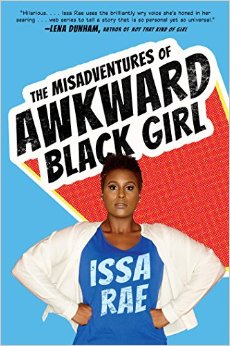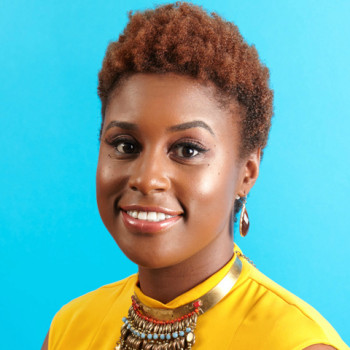Hey, my name is Issa Rae, most known for my web series, “The Misadventures of Awkward Black Girl.” And I have a new book called “The Misadventures of Awkward Black Girl.” Surprise, surprise. The book is part memoir and part guide for the awkward. And I’d love to read you an excerpt. It’s called “ABG Guide: The Hair Advantage.”
 For the masses, the hair of the Awkward Black Girl (and even Boy) is an enigma. Though not generallyknown, NASA is even examining strands of our hair for space research, as its gravity-defying properties are key to missing answers in the field of aeronautics. Its buoyancy and ability to shrink when exposed to water is also rumored to be studied by scientists interested in underwater living.
For the masses, the hair of the Awkward Black Girl (and even Boy) is an enigma. Though not generallyknown, NASA is even examining strands of our hair for space research, as its gravity-defying properties are key to missing answers in the field of aeronautics. Its buoyancy and ability to shrink when exposed to water is also rumored to be studied by scientists interested in underwater living.
It’s not just appealing to science; entrepreneurs see opportunity too. Every day more and more products appear to cater to the diverse spectrum of our hair. Each new product claims the ability to tame our hair in a way that other manufacturers don’t understand. Subscription boxes, forums, online videos, community meet-ups, and conferences are all dedicated to the mastery of hair. It’s a billion-dollar industry.
For the Awkward Black Girl, it is important to view hair as the ultimate form of expression, an opportunity to be noticed and/or to be understood. Complete strangers can become allies or even friends due to respect for each other’s hair. This can be positively promising. But there remains a sensitivity with our hair when others express unwarranted opinions and questions.
Even within the black community, hair adjectives like laid, fried, nappy, jacked, whipped, dry, and snatched are all used to convey approval or disapproval. They are used judgmentally, as if they assess not just hair but also character, quality of life, and decision-making skills. When dealing with people who pose so-called questions even as they judge you, here are some foolproof responses.
Question: “Is it real?”
Thanks to the widespread popularity of hair extensions, this question is no longer asked solely within the black community. Some people are even desensitized to the question. For those who aren’t, the proper response is usually, “Is yours?” with a smile. If that person does not relent, you can try, “It’s as real as you are bold,” with a friendly chuckle. Passive aggression is absolutely appropriate in this instance. (Equal offenders: Is it yours? How long is your actual hair? )
Opinion: “It’s so soft. I wasn’t expecting that.”
A backhanded compliment I receive often, it always begs the silently self-posed question, “What exactly were you expecting? Did you expect it to prick you like cotton plants or to feel rough like gauze tape?” This usually comes from friends I’ve let touch it, or whom I’ve asked to braid my hair, or from chatty hairstylists. The only response I’ve been able to muster is a curt, “I know, isn’t it?”
Question: “Can I touch it?”
The dreaded question that many with “ethnically expansive” hair have heard countless times. A simple, “Are your hands clean?” not only infantilizes the request, but it also sends the message that your hair isn’t the sheep exhibit at the petting zoo. Should you decide to decline the request, a polite “I’d rather you not” should do the trick. If you see that the asker’s spirit is crushed, and you’re inclined to care, simply qualify your denial with, “I’m very tenderheaded.”
Opinion: “You should press it.”
This opinion is almost always unsolicited. It is an opinion most commonly held by the older generation in the South where, in certain parts, natural hair is meant to be hidden, not seen. So as not to cause confusion or uproar, a simple “Maybe” or “One day” is enough to give them the hope that you’ll gain some sense and “do something with that hair.”
Question: “How did you get your hair like that?”
If the question’s context refers to a complicated hairstyle, i.e. gravity-defying twists or an insanely thick side bun, this question is acceptable. If this question refers to one ‘s hair texture, i.e. “Can I make my hair ‘nappy’ like yours?” or “Why doesn’t my hair shrink when water touches it?” then we have a problem. Because “kinkify it” is not a readily available option in the hair salon, those whose scalps don’t naturally produce such awe-inducing tresses may be confused or uninformed. So as not to exhaust oneself by explaining genetics, an appropriate response would be, “I woke up like this.”
Opinion: “I wish my hair did that.”
Ah, hair envy. There is no proper response to appease those who can’t achieve the nap-tural roots. But this admission, especially given the self-esteem-threatening history of “nappy” rejection, is always appreciated. An appropriate response is, “Thanks.”
By the year 2100, when the world is even more globally connected, with intergalactic travel common and interracial mixing the default, we can expect less of a fascination with the mystery of “black” hair. Until then, during your lifelong hair journey, understand that many will want to touch your hair and some will. A number will speculate on its authenticity; few will care. Consistency is boring. Variety is key. Don’t be afraid to try various styles and numerous textures, with confidence. Proudly exclaim, “I can wear my hair however I want, whenever I want, anywhere I want!” The advantages of black hair are infinite.


